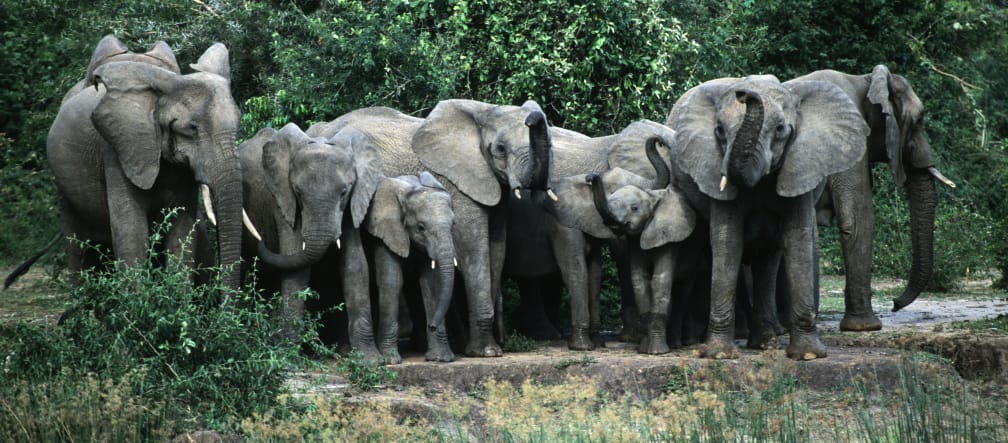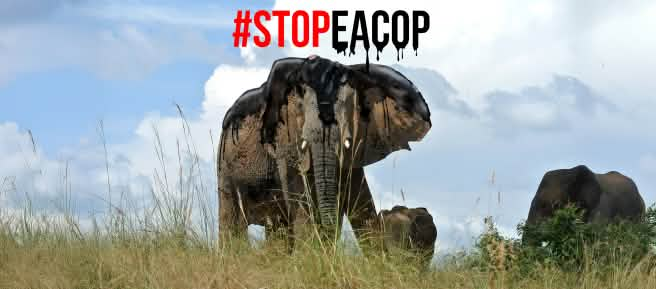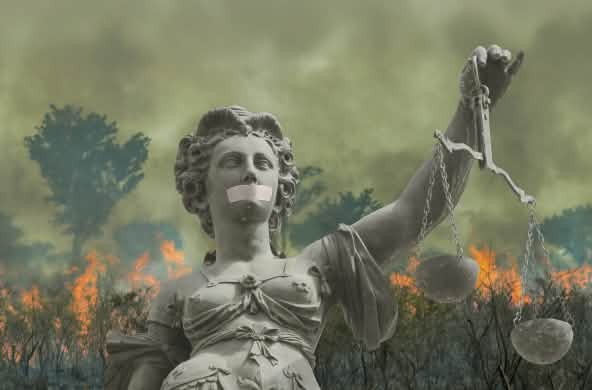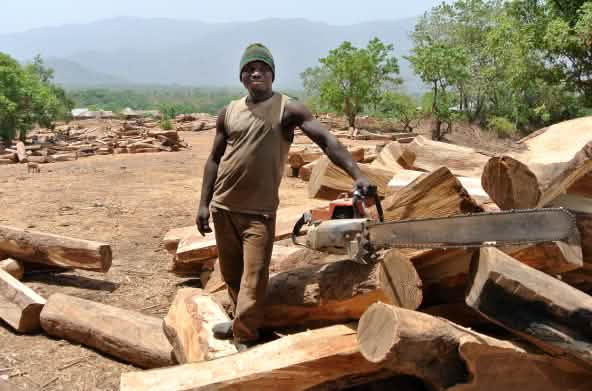
Completed campaign
Uganda: keep the oil in the ground – save Murchison Falls!
Uganda sits on vast oil resources, and three companies are ready to drill – in of all places, Murchison Falls National Park. A Chinese construction company is already expanding a road that cuts through the protected area. Speak out against this disaster in the making!
News and updatesTo: the President of Uganda, Yoweri Museveni; the management of TotalEnergies, CNOOC, CCCC, Exim Bank of China
“Oil drilling and infrastructure projects are a huge threat to Murchison Falls National Park and Lake Albert. Put a stop to this disaster in the making.”Murchison Falls National Park is one of Africa’s jewels. Every year, thousands of nature lovers come from all over the world to enjoy the spectacle of the Victoria Nile thundering down the cliffs of a narrow gorge.
The Albertine Graben region is home to wildlife such as lions, elephants and hippos, and at least 500 further animal species. It is listed as an Important Bird and Biodiversity Area (IBA) and a Ramsar site because of its exceptional wetlands.
This could soon be history if France's TotalEnergies, UK-based Tullow Oil and China National Offshore Oil Corporation (CNOOC) were to drill 419 wells in the region and extract 200,000 barrels a day. They would also build a refinery, an industrial zone and a 1,445-kilometer pipeline to the harbor of Tanga in Tanzania.
In early 2019, China Communications Construction Company (CCCC) started expanding a dirt track through Murchison Falls National Park used mainly by safari tourists, widening and paving it for heavy vehicles. The road expansion will fragment the national park and cut off wildlife corridors. Environmental activists are convinced that the only possible purpose for the road is to serve the oil industry.
CCCC is one of the biggest construction companies globally. Its projects are textbook examples of how China initiates, finances and realizes major undertakings that run roughshod over the local environment in numerous countries.
Resistance is growing in Uganda: environmentalists and civil society are calling on the government to protect the environment and the livelihoods of ordinary Ugandans from the fossil-fuel industry.
Our aim is clear: Save the Murchison Falls region – tell Uganda to keep the oil in the ground!
Uganda: keep the oil in the ground – save Murchison Falls!
Murchison Falls National Park was established in 1952 and covers an area of 3,878 square kilometers. Scientists have counted 144 mammal, 51 reptile and 755 plant species in the region’s savanna ecosystems, which also includes the Budongo, Bugoma and Wambabya protected areas.
Oil in Murchison Falls National Park – the companies involved
The oil reserves are estimated at 6.5 billion barrels. Between 2011 and 2012, TotalEnergies and CNOOC each acquired a 33-percent share from the stakeholder, UK-based Tullow Oil.
A number of nature conservation and human rights organizations are already fighting against TotalEnergies, complaining of land grabbing, the loss of the livelihood of many local people and impoverishment. Les Amis de la Terre France and others are filing a lawsuit against the oil company in Paris, referring to a law on corporate responsibility that also applies to foreign subsidiaries.
Tullow Oil, based in London, which bills itself as “Africa's leading independent oil company”, is active in 15 countries in Africa, South America and off Jamaica. Its main business activity is the exploration of new oil and gas fields on land and offshore.
China National Offshore Oil Corporation (CNOOC) is the third largest oil company in the People’s Republic of China. It mainly operates in Africa, Iran and more recently in Europe and North America. The company is 70 percent state-owned.
China Communications Construction Company (CCCC) is one of the largest construction groups in the world. In Uganda, it built the 40-kilometer expressway between Entebbe Airport and the capital city, Kampala.
The Export Import Bank of China is involved in the destruction of the Murchison Falls National Park as a financier. The cost for the construction of three “national oil roads” has been estimated at around €485 million, of which 85 percent (€410 million) will be covered by a loan. In addition to CCCC, two other Chinese companies are involved.
According to environmentalists, the start of construction by CCCC is illegal. For example, it is unclear whether an environmental impact assessment has been carried out. During two public hearings on the Tilenga project, it became apparent that numerous regulations had been violated.
Protected areas without protection
In many countries, governments are opening protected areas to resource exploitation, dams and infrastructure projects: In the Democratic Republic of the Congo, the Virunga and Salonga National Parks are threatened by oil drilling, while the Canadian company Banro wants to mine gold in Itombwe Nature Reserve. In Guinea, the Chinese Sinohydro Group is planning a dam in the new Moyen-Bafing National Park; in Tanzania, the Unesco World Heritage site Selous is also threatened by a dam.
Roads open “Pandora’s box”
Environmentalists compare the construction of roads to opening a Pandora’s box of environmental evils and draw parallels to the spread of cancer cells. Satellite images show how, after a road is opened between population centers, numerous side roads soon branch off into the countryside in a herringbone pattern. These are both official and unofficial roads, some of which are built by logging companies.
Roads open previously inaccessible areas to agriculture (farms, plantations, cattle feedlots), logging, mining, poaching and settlement. Many of the threats to rainforests are associated with the construction of roads. In the tropics, 95 percent of all deforestation takes place within five kilometers of the nearest road.
To: the President of Uganda, Yoweri Museveni; the management of TotalEnergies, CNOOC, CCCC, Exim Bank of China
President Museveni,
Ladies and Gentlemen,
The Murchison Falls landscape is one of Africa's jewels. The variegated ecosystems of the Albertine Graben are home to iconic species such as lions, elephants, and hippos, as well as at least 500 further animal species. Every year, thousands of tourists from around the world visit Murchison Falls and generate a substantial income for local people and Uganda itself.
The unique ecosystems of the region and the livelihoods of the people would be endangered by the Tilenga oil exploitation project and related infrastructure measures. Uganda’s tourism sector and its reputation as a nation caring for environmental protection and the climate would suffer profoundly.
First damages are already visible, as work on the extension of a road cutting through Murchison Falls National Park has begun.
We respectfully ask you to:
- Stop the Tilenga project. Keep the oil in the ground.
- Stop all projects connected to oil exploitation such as road works.
Yours faithfully,
The construction of the EACOP and the associated Tilenga and Kingfisher oil projects has already caused significant damage. According to satellite image analyses by the organization Earth Insight from June 2025, the following developments have been recorded:
- In Murchison Falls National Park, 38 kilometers of roads and 9 drilling sites have been constructed for Tilenga. In addition, 15 more drilling sites have been established on the edge of the park and in the catchment areas of the Nile and Lake Albert.
- Construction of the Tilenga feeder pipelines has already led to the destruction of 630 square kilometers of vegetation.
- Roads have been built on both banks of the Nile, where a pipeline river crossing may soon be built.
- 44 protected areas and 7 key biodiversity areas have been crossed.
Analyses indicate that 39 percent of the EACOP pipeline and 22 percent of the Tilenga feeder pipelines have either been built or had vegetation cleared for them. Media reports sometimes claim 60 percent instead of 39 percent, but no sources are provided for this figure.
The figures show that despite construction progress, EACOP and Tilenga are far from completion. The same is true for the Kingfisher oil field. Protests and related financial difficulties have caused delays.
The resistance of local communities – and the ongoing criticism from human rights defenders and environmentalists – continues. The oil projects can still be stopped!
Our partner Tasha
We are helping to make that happen: together with our partner organization Tasha in Uganda, we have launched a new media project. In workshops, 15 to 20 young people are being trained to conduct interviews in villages for radio programs and podcasts. The goal is to give a voice to those already suffering from the oil projects. So far, these voices have received far too little attention.

We have been calling for a halt to the EACOP pipeline project since October 2019 through a petition and other actions. Thanks to a broad resistance movement, construction has made little progress, and the details of the original petition have since become outdated. We are therefore closing the petition and will continue our work within the #StopEACOP network until the project is finally abandoned.
A new analysis by NGOs suggests that CNOOC and TotalEnergies – the corporations involved in the multi‑billion‑dollar project – continue to face financing challenges. At the same time, a court in Paris has convicted TotalEnergies of greenwashing.
Environmental activist Bob Baribye is fighting in Uganda for the climate and against the EACOP oil pipeline. He spent 85 days in jail for peaceful protest.
The government of Uganda is taking harsh measures against environmental activists seeking to stop the EACOP oil pipeline. Eleven critics of the project spent 85 days behind bars after attempting to deliver a letter of protest to Kenya Commercial Bank in Kampala. They have now been released on bail.
Students who were peacefully demonstrating against the EACOP pipeline project have been arrested in Uganda. The nine detainees had protested with others in front of the headquarters of Stanbic Bank in Kampala, which reportedly intends to participate in financing the oil pipeline. Videos and photos show armed security forces taking the demonstrators away.
Ugandan police and authorities continue to criminalize students who oppose oil projects. On November 24, seven students were once again arrested in Kampala for peacefully protesting the construction of the East African Crude Oil Pipeline (EACOP). The young environmental activists are being held in Luzira Maximum Security Prison.
The trial of nine young environmental activists in Uganda is finally over. On Monday, a court in Kampala dismissed the case against the students who had been arrested while peacefully protesting the EACOP oil pipeline. The activists stood their ground for more than a year and intend to keep fighting.
The planned EACOP pipeline and two other oil projects are threatening people and the environment in Uganda, including Murchison Falls National Park. Our partner organization TASHA Research Institute Africa is informing people in numerous villages about the dangers they face and their rights. Radio spots are playing an important role in this campaign.
Fossil fuel giant TotalEnergies is having problems finding banks and insurance companies willing to partner in its planned EACOP pipeline in eastern Africa. 24 major banks and 18 insurance companies have stated that they will not support the project in Uganda and Tanzania. Protests by the worldwide StopEACOP network, including Rainforest Rescue, are playing a key role in this success.
The resistance against the planned EACOP oil pipeline and oil production in Murchison Falls National Park has received unexpected support: The European Parliament issued a resolution warning against the devastating consequences of the projects for the environment and climate and condemning human rights violations.
Is oil exploration in Uganda’s Murchison Falls National Park causing elephants to flee the area, leading to dangerous encounters in human settlements? Local people are convinced of this and are sounding the alarm.
The planned EACOP oil pipeline in Africa is running out of potential financiers: According to an insider, Deutsche Bank has decided not to participate in the project in Uganda and Tanzania. The pipeline poses major environmental risks, is detrimental to the local population and runs counter to the fight against the climate crisis.

